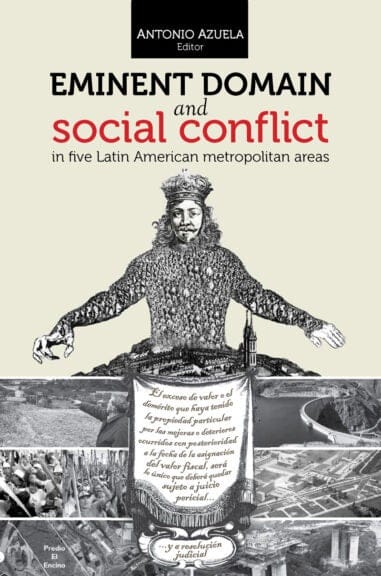Other Publications

Eminent Domain and Social Conflict in Five Latin American Metropolitan Areas
Edited by Antonio Azuela
June 2017, English
Lincoln Institute of Land Policy
As a policy instrument, expropriation is often considered a last resource to meet public and social needs. This book, translated from the original Spanish edition, explores how five metropolitan areas in Latin America have used expropriation, shows the conflicts that it generates, and examines the way judges resolve (or fail to resolve) the dilemmas it poses.
Table of Contents
Foreword
Gregory K. Ingram
Introduction
Eminent Domain, Property, and the State in Latin American Cities
Antonio Azuela
Chapter One
Urban Policies and Eminent Domain in Argentina: Cases from the City of Buenos Aires and the Province of Buenos Aires (1976–2007)
Juan Duarte and Angela Oyhandy
Chapter Two
Eminent Domain in Argentina: Practices and Legal Debates Germane to Public Interest
Angela Oyhandy and Melinda Lis Maldonado
Chapter Three
Judicial Valuation and Delayed Payment of Compensation: The Case of Eminent Domain in the State of São Paulo, Brazil
Emílio Haddad and Cacilda Lopes dos Santos
Chapter Four
Strengths and Weaknesses in the Use of Urban Eminent Domain in Colombia: Review Based on the Experience of Bogota
María Mercedes Maldonado
Chapter Five
Constitutional Change, Judges, the Social Function of Property, and Eminent Domain in Colombia
María Mercedes Maldonado and Diego Isaías Peña
Chapter Six
Eminent Domain in Quito: Institutional Change and Municipal Government
María Mercedes Maldonado
Chapter Seven
Courts, Human Rights Cases, and Compensation of Eminent Domain: Case Studies in Ecuador
María Mercedes Maldonado and Diego Isaías Peña
Chapter Eight
Use, Overuse, and Reuse of Eminent Domain in Mexico City
Antonio Azuela and Camilo Saavedra
Chapter Nine
Property not under Discussion: The Courts and Eminent Domain in Mexico City
Antonio Azuela and Carlos Herrera
Keywords
Dispute Resolution, Land Law, Legal Issues, Urban
